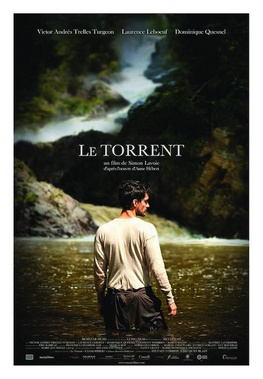Top Qs
Timeline
Chat
Perspective
The Torrent (2012 film)
2012 Canadian film From Wikipedia, the free encyclopedia
Remove ads
The Torrent (French: Le torrent) is a Canadian drama film, directed by Simon Lavoie and released in 2012.[1] An adaptation of Anne Hébert's novella Le Torrent,[2] the film centres on the life of François (played by Anthony Therrien as a child and Victor Andrés Trelles Turgeon as an adult), a man who was raised by his devoutly religious and abusive mother Claudine (Dominique Quesnel).[3] Left deaf when his refusal to obey her demand that he enter the seminary to become a Catholic priest led Claudine to hit him on the head, he has continued to live in rural isolation, and struggles to establish human connection when he purchases Amica (Laurence Leboeuf), a woman being sold into slavery who is eerily similar to his mother in her youth.[4]
The film premiered at the Festival du nouveau cinéma in October 2012.[5]
The film received six Prix Jutra nominations at the 15th Jutra Awards in 2013, for Best Actor (Trelles Turgeon), Best Actress (Quesnel), Best Art Direction (Éric Barbeau), Best Cinematography (Mathieu Laverdière), Best Original Music (Normand Corbeil) and Best Sound (Luc Boudrias, Marcel Chouinard and Patrice Leblanc).[6]
Remove ads
Plot summary
Summarize
Perspective
This section needs expansion. You can help by adding to it. (August 2022) |
The story centers on François, a man raised in rural Quebec by his devoutly religious and abusive mother, Claudine. From childhood, François lives under the oppressive control of his fanatically Catholic mother, who dominates every aspect of his existence with rigid religious doctrine and harsh discipline. Claudine's ultimate ambition is to see her son enter the priesthood, viewing this as both a spiritual calling and a means of maintaining control over him.
The pivotal moment in François's life occurs when he reaches young adulthood and finds the courage to defy his mother's ironclad expectations. When François refuses to comply with Claudine's demand that he enter the seminary to become a Catholic priest, her reaction is swift and violent. In a fit of religious fervor and maternal rage, Claudine strikes him brutally on the head, causing permanent damage that leaves François completely deaf. This act of violence serves as both literal and symbolic severing—cutting François off not only from the world of sound but also marking his definitive break from his mother's suffocating influence.
The deafness becomes a defining characteristic of François's adult life, isolating him further from society and creating an additional barrier to human connection. As an adult, François continues to live in the same rural isolation where he was raised, now haunted by the psychological trauma of his upbringing. The remote Quebec countryside becomes both his refuge and his prison, reflecting his internal state of emotional desolation.
François's attempts to establish meaningful human relationships are consistently undermined by his inability to trust, communicate effectively, or overcome the deep-seated fears instilled by his mother's abuse. His world is turned upside down when he encounters an opportunity to purchase Amica, a young woman being sold into servitude—a practice that speaks to the harsh realities of rural life in the era depicted.
What makes this encounter particularly psychologically complex is Amica's striking physical resemblance to Claudine as she appeared in her youth. This uncanny similarity forces François to confront the unresolved trauma of his relationship with his mother, creating a psychological minefield as he attempts to navigate his feelings toward Amica. The resemblance serves as a constant reminder of his past while simultaneously offering the possibility of a different kind of relationship—one based on mutual respect rather than dominance and control.
Remove ads
Cast
- Victor Andrés Trelles Turgeon as François
- Laurence Leboeuf as Amica / Claudine (jeune)
- Dominique Quesnel as Claudine
- Anthony Therrien as François (enfant)
- Marco Bacon as Colporteur
- Roger Blay as Clochard
- Normand Canac-Marquis as Proviseur
- Aubert Pallascio as Vieil instituteur
- Martin Desgagné as instituteur
References
External links
Wikiwand - on
Seamless Wikipedia browsing. On steroids.
Remove ads

